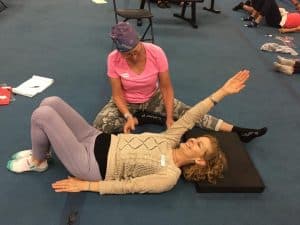Why is it Important to Understand the Specific Limitations of Breast Cancer Surgery Prior to Exercising?
 Understanding the specific limitations of breast cancer surgery before exercising is important for several reasons:
Understanding the specific limitations of breast cancer surgery before exercising is important for several reasons:
 Postoperative recovery: Breast cancer surgery can involve different procedures, such as lumpectomy, mastectomy, or lymph node removal. Knowing the type of surgery and its potential complications helps you tailor your exercise routine to support your recovery. Certain exercises may be contraindicated immediately after surgery, while others may be beneficial for regaining strength and mobility.
Postoperative recovery: Breast cancer surgery can involve different procedures, such as lumpectomy, mastectomy, or lymph node removal. Knowing the type of surgery and its potential complications helps you tailor your exercise routine to support your recovery. Certain exercises may be contraindicated immediately after surgery, while others may be beneficial for regaining strength and mobility.
 Avoiding complications: Exercising without awareness of surgery-related limitations can lead to complications such as infection, wound breakdown, or lymphedema. By understanding these limitations, and working with a CETI Cancer Exercise Specialist, you can avoid exercises that might exacerbate these issues and take appropriate precautions to minimize the risk. It is critical that you regain your shoulder range of motion prior to adding resistance and progress slowly to prevent lymphedema and other possible complications. Following FLAP reconstruction, there may be muscle imbalances that can lead to joint pain, injury, and future degeneration. A CETI Cancer Exercise Specialist will conduct a comprehensive assessment and design a safe, effective, and INDIVIDUALIZED program just for you.
Avoiding complications: Exercising without awareness of surgery-related limitations can lead to complications such as infection, wound breakdown, or lymphedema. By understanding these limitations, and working with a CETI Cancer Exercise Specialist, you can avoid exercises that might exacerbate these issues and take appropriate precautions to minimize the risk. It is critical that you regain your shoulder range of motion prior to adding resistance and progress slowly to prevent lymphedema and other possible complications. Following FLAP reconstruction, there may be muscle imbalances that can lead to joint pain, injury, and future degeneration. A CETI Cancer Exercise Specialist will conduct a comprehensive assessment and design a safe, effective, and INDIVIDUALIZED program just for you.
Lymphedema prevention: Lymphedema is a common concern after breast cancer surgery, particularly when lymph nodes are removed. Knowledge of the surgery’s limitations can help you learn techniques to reduce the risk of lymphedema, such as avoiding overly strenuous exercises and gradually increasing activity levels.


Timing of exercise: The timing of when you can safely resume exercise after breast cancer surgery may vary depending on the surgery type and individual factors. Understanding these limitations can help you know when it’s appropriate to start exercising and what types of activities are suitable during different stages of your recovery.
In summary, understanding the limitations imposed by breast cancer surgery is crucial for designing a safe and effective exercise regimen that supports your recovery, minimizes complications, and promotes your overall well-being. Always consult with a CETI Cancer Exercise Specialist before starting or modifying your exercise routine after surgery to ensure it aligns with your specific circumstances.
